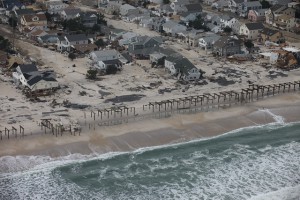New Jersey Future Blog
DEP Gathers Input at Coastal Resilience Summit on Local Actions To Plan for Climate Change
October 23rd, 2018 by Tanya Rohrbach
New Jersey Future provided information on innovative planning strategies and implementation actions from other coastal locations

Damaged homes along the Jersey Shore (Courtesy of Greg Thompson, USFWS)
Temperatures are rising faster in New Jersey than the national average, and the rate of sea level rise is accelerating faster in New Jersey than globally, according to Bob Kopp, director of the Rutgers University Institute of Earth, Ocean, and Atmospheric Sciences. At the 2018 New Jersey Coastal Resilience Summit convened October 9-10 at Monmouth University by the New Jersey Department of Environmental Protection, he and other climate experts presented data to show the extent to which sea level rise due to climate change will affect New Jersey’s coastal communities based on various scenarios of intensity. Emerging sea level rise and climate impact projections for New Jersey, coupled with the recent IPCC report indicating that the need for global climate mitigation and adaptation is urgent, fortunately hasn’t been overlooked by the DEP. In her remarks at the summit, DEP Commissioner Catherine McCabe emphasized that there is a clear need for New Jersey to act soon and to act swiftly.
The invitation-only summit was an initial step in the DEP’s formulation of the New Jersey Coastal Resilience Plan, in which New Jersey Future is playing a key role. Climate experts and leaders in the state were invited to the summit to provide guidance and input to the DEP in formulating a framework for building resiliency in the tidally influenced areas of the state, which contain 53 percent of New Jersey’s population in 239 municipalities. New Jersey Future Planning Manager David Kutner, AICP PP, presented an information session, Planning for the Future: Innovative Community Actions, which stressed the importance of smart planning and provided examples of local and regional resiliency actions from more than 70 communities outside New Jersey. Other presentations at the summit addressed issues of equity and community social or environmental vulnerability, the need for statewide sea level rise and flooding standards, and nature-based and infrastructure shoreline resilience strategies.
The DEP is relying on leaders like New Jersey Future for their expertise and insight as the state works to guide coastal land-use patterns toward climate adaptation and resilience. All attendees were asked to provide comments and recommendations to the DEP, but the DEP isn’t only soliciting input from professionals. They want input from all stakeholder groups. To contribute, you can email the DEP (coastalresilience nj
nj dep
dep gov) with your response to the their question, “How should the DEP work with communities, various sectors and other agencies to reduce flood risk in the coastal zone?”
gov) with your response to the their question, “How should the DEP work with communities, various sectors and other agencies to reduce flood risk in the coastal zone?”















